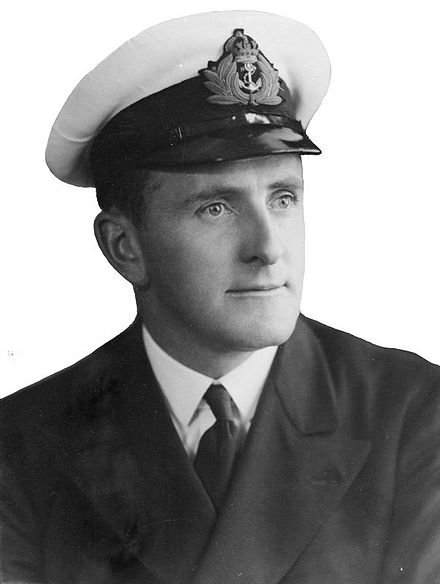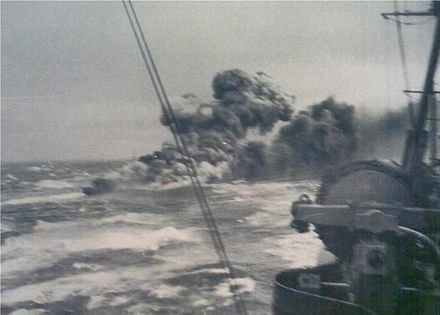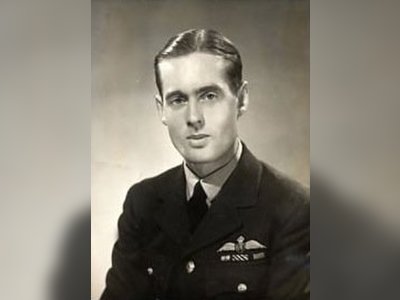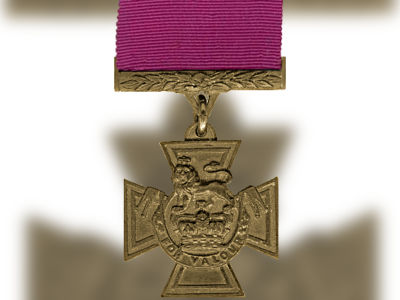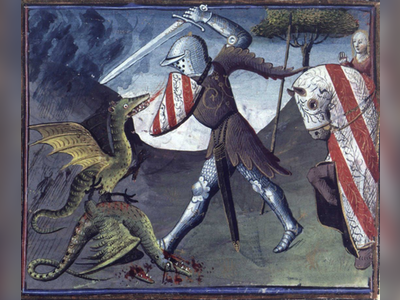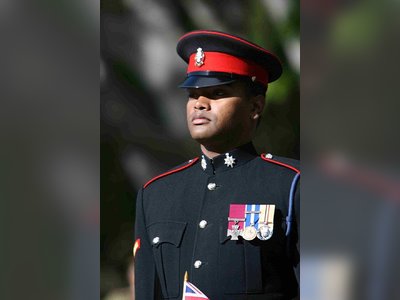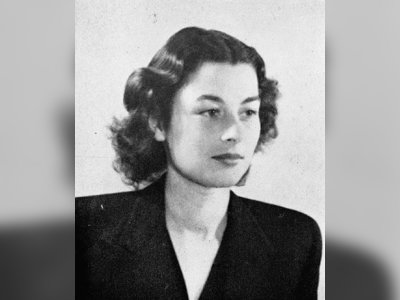British Heritage
Remember, Cherish, Learn.
beta
Gerard Broadmead Roope
The Legacy of Lieutenant-Commander Gerard Broadmead Roope: A Beacon of Bravery in British Heritage.
Lieutenant-Commander Gerard Broadmead Roope VC RN, an illustrious figure in the annals of British military history, shines as a beacon of unparalleled bravery, commitment, and self-sacrifice. His conspicuous courage in the face of adversity not only won him the highest military honor in Britain - the Victoria Cross (VC) - but also indelibly inscribed his name in the rich tapestry of British heritage. Roope’s saga of gallantry during the tumultuous days of the Second World War is an enduring testament to the valorous spirit that is an essential part of the British ethos.
Gerard Broadmead Roope was born on 13th March 1905, in the serene environs of Hillbrook, Trull, near Taunton in Somerset. He was the offspring of Gerard Roope, a man of independent wealth, and Florence, the daughter of Thomas Palfrey Broadmead, a Justice of the Peace hailing from Enmore Castle, Somerset. The Broadmead family, having owned Enmore Castle since the 1830s, were respected members of the landed gentry.
Roope received his formal education from the Royal Naval College, Dartmouth, embarking upon his journey with the navy at the tender age of 13. His naval career was initiated on 15th January 1923 when he was assigned the role of midshipman in the gunroom of the mighty battle-cruiser HMS Revenge. In the years that followed, Roope served with distinction on the Concord and Caledon as a sub-lieutenant, and on the Marlborough as a lieutenant. His rise in the ranks culminated in his appointment as the commanding officer of the G-class destroyer HMS Glowworm on 22nd July 1938.
Roope's true mettle as a naval officer was put to the test on the fateful day of 8th April 1940, in the harsh, frigid waters of the Norwegian Sea. The HMS Glowworm, under the audacious command of Lt-Cdr Roope, engaged in combat with two enemy destroyers while sailing alone towards Norway's West Fjord. Recognising that the enemy vessels were luring him towards the more formidable German capital ships, Roope resolved to pursue his opponents.
This daring chase led the Glowworm to the German cruiser Admiral Hipper. Even as the vastly superior cruiser loomed ominously ahead, Roope intrepidly chose to engage in combat. Though the Glowworm managed to launch ten torpedoes and scored one hit on the German cruiser, it was eventually overcome by the enemy's firepower and was set ablaze. In a final act of audacious defiance, Roope ordered the heavily damaged Glowworm to ram the cruiser, inflicting significant damage on the German vessel before the destroyer capsized and sank. Roope, in his final moments, heroically endeavored to aid the rescue of his crew, eventually succumbing to the waves. His actions, which bore witness to his extraordinary courage and commitment, left an indelible impression on the Admiral Hipper's commander, Hellmuth Heye, who commended Roope's bravery to the British authorities via the Red Cross.
The Victoria Cross awarded to Roope was justified not only by his comrades' testimonies but also remarkably by the commendation of his enemy. The citation for the award celebrates Roope's fearless pursuit of a superior enemy force, his relentless attack under overwhelming odds, and his decision to ram the enemy vessel, marking his actions with supreme coolness and skill.
His widow received this prestigious honour on 12 February 1946, six years after the extraordinary incident in the Norwegian Sea. As of now, this Victoria Cross remains in private hands and is not on public display, serving as a poignant reminder of Roope’s unfaltering courage and sacrifice.
Beyond his military life, Roope was a loving husband to Faith Dulcibella and a doting father to their two children. He married Faith, daughter of George Frederick Clarke, a gentleman of the landed gentry, and they resided in Richmond, then part of Surrey (now Greater London).
His extraordinary courage and valor continue to inspire generations, transcending the boundaries of time and space. His life and actions serve as the basis for Larry Forrester's novel, Battle of the April Storm. The book, albeit with fictional characters, vividly recounts the heroic final action of the Glowworm and pays homage to the brotherhood between mariners, even in the face of enmity.
In conclusion, the life and heroism of Lieutenant-Commander Gerard Broadmead Roope are an integral part of British heritage. His commitment to duty, fearlessness in the face of danger, and selfless sacrifice remain enduring symbols of the British spirit. His posthumous award of the Victoria Cross, justified by testimonies from both his comrades and the enemy, is a testament to the indomitable courage he displayed, thereby etching his name in the annals of British military history.
Early Years and Naval Career: The Making of a Hero
Gerard Broadmead Roope was born on 13th March 1905, in the serene environs of Hillbrook, Trull, near Taunton in Somerset. He was the offspring of Gerard Roope, a man of independent wealth, and Florence, the daughter of Thomas Palfrey Broadmead, a Justice of the Peace hailing from Enmore Castle, Somerset. The Broadmead family, having owned Enmore Castle since the 1830s, were respected members of the landed gentry.
Roope received his formal education from the Royal Naval College, Dartmouth, embarking upon his journey with the navy at the tender age of 13. His naval career was initiated on 15th January 1923 when he was assigned the role of midshipman in the gunroom of the mighty battle-cruiser HMS Revenge. In the years that followed, Roope served with distinction on the Concord and Caledon as a sub-lieutenant, and on the Marlborough as a lieutenant. His rise in the ranks culminated in his appointment as the commanding officer of the G-class destroyer HMS Glowworm on 22nd July 1938.
Courage Under Fire: The Battle in the Norwegian Sea
Roope's true mettle as a naval officer was put to the test on the fateful day of 8th April 1940, in the harsh, frigid waters of the Norwegian Sea. The HMS Glowworm, under the audacious command of Lt-Cdr Roope, engaged in combat with two enemy destroyers while sailing alone towards Norway's West Fjord. Recognising that the enemy vessels were luring him towards the more formidable German capital ships, Roope resolved to pursue his opponents.
This daring chase led the Glowworm to the German cruiser Admiral Hipper. Even as the vastly superior cruiser loomed ominously ahead, Roope intrepidly chose to engage in combat. Though the Glowworm managed to launch ten torpedoes and scored one hit on the German cruiser, it was eventually overcome by the enemy's firepower and was set ablaze. In a final act of audacious defiance, Roope ordered the heavily damaged Glowworm to ram the cruiser, inflicting significant damage on the German vessel before the destroyer capsized and sank. Roope, in his final moments, heroically endeavored to aid the rescue of his crew, eventually succumbing to the waves. His actions, which bore witness to his extraordinary courage and commitment, left an indelible impression on the Admiral Hipper's commander, Hellmuth Heye, who commended Roope's bravery to the British authorities via the Red Cross.
The Medal of Valour: The Posthumous Victoria Cross
The Victoria Cross awarded to Roope was justified not only by his comrades' testimonies but also remarkably by the commendation of his enemy. The citation for the award celebrates Roope's fearless pursuit of a superior enemy force, his relentless attack under overwhelming odds, and his decision to ram the enemy vessel, marking his actions with supreme coolness and skill.
His widow received this prestigious honour on 12 February 1946, six years after the extraordinary incident in the Norwegian Sea. As of now, this Victoria Cross remains in private hands and is not on public display, serving as a poignant reminder of Roope’s unfaltering courage and sacrifice.
Personal Life and Beyond
Beyond his military life, Roope was a loving husband to Faith Dulcibella and a doting father to their two children. He married Faith, daughter of George Frederick Clarke, a gentleman of the landed gentry, and they resided in Richmond, then part of Surrey (now Greater London).
His extraordinary courage and valor continue to inspire generations, transcending the boundaries of time and space. His life and actions serve as the basis for Larry Forrester's novel, Battle of the April Storm. The book, albeit with fictional characters, vividly recounts the heroic final action of the Glowworm and pays homage to the brotherhood between mariners, even in the face of enmity.
In conclusion, the life and heroism of Lieutenant-Commander Gerard Broadmead Roope are an integral part of British heritage. His commitment to duty, fearlessness in the face of danger, and selfless sacrifice remain enduring symbols of the British spirit. His posthumous award of the Victoria Cross, justified by testimonies from both his comrades and the enemy, is a testament to the indomitable courage he displayed, thereby etching his name in the annals of British military history.
- Gerard Broadmead Roopeen.wikipedia.org
